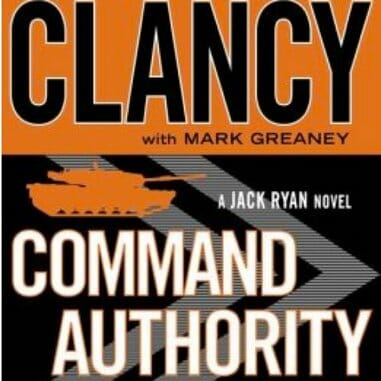Command Authority by Tom Clancy with Mark Greaney
The Military-Entertainment Complex

It really arrived in November with the witches who shriek across the Great Lakes, scoring the gunmetal surface with their nails, and with the percussive thwack, pause, pumpf that accompanies the heavier hitting of late autumn days—the savage melody of conference play in college football.
It arrived as stars and stripes. The flag, our flag, which causes grown men to cry, at first glance seemed nearly distressed—in the design/fashion/aesthetic sense. The flag seemed less national emblem than something closer to its camo cousins, those screamingly alive too, inherently obvious to the eye—an existence either ironic or stupid or perhaps both (but one that ends up being neither, really, once one understands its intent). Screamingly obvious even when not rendered in school colors—dandelion and chocolate, anyone?
The Jackson Pollocking or digital pixilating ran up and down flanks, wrapped thighs, filled in logos, comprised whole fucking jerseys. It struck one as camouflage suffering an existential crisis, camouflage meant to be seen.
The camo seemed a most paradoxical, obviously unhealthy manifestation of an obsession with military strength…and perhaps the most absurd expression of a desire for Mars to cast his glance and smile upon the rest of us, those of us not directly engaged in his terrible trade yet still so enamored and supportive and thankful for others willing to fling themselves into the God of War’s machinations.
The rest of us salute, perhaps, those others who avail themselves alone to the fanged and cunning realm of the most robust military-industrial complex civilization has ever known, a salute exemplified in camo jerseys, in sport-as-war metaphors like football, in Nike ProCombat…and made manifest in Tom Clancy, our martial Shakespeare, our para-literary God of War, our poet laureate of Pistol Patriotism, may he rest in peace.
Imagine, if you will, a celebrant or participant or simply existing being in a public space exercising his or her 2nd Amendment rights in that most obvious of ways—the open carry. No matter how congenial the person, how unthreatening or familiar, perched upon that joe’s iliac crest rides a brown recluse, a Browning recluse, whose bite devours flesh.
Pistol Patriotism, our deep love for country and its muscle, seems benign yet surely signifies how, with minimal effort, proceedings could escalate. Implements of war…currently shrouded in pomp & circumstance, in teary-eyed, hard-on’d, flag-waving, slightly-distasteful-in-its-sloppyness-yet-inherently-chaste-and-honestly-honorific-and-thankful patriotic love…can quickly tack towards Mars, standards unfurled before cavalry instead of cheerleaders.
If it seems we have been teetering close to this callous edge, with regard to the proper reverence for the people and trapping of war, it is because we have, ever since 9/11 coated our hearts in blood and tears and anger and ash.
But now, 12 years after? We find pushback. Public sentiment seemed sour when Northwestern and Under Armor appeared to wave the bloody shirt in that recent football game when the team appeared in American-flag-themed jerseys.
Noted uniform journalist and ESPN columnist Paul Lukas decried the commercialization…the appropriation of conflict…and gave it the portmanteau title of “G.I. Joevember.” The Associated Press went to veterans themselves; many found the supposed “honor” in children playing soldier (and others profiting from it) to be, at best, well-meaning but hollow…at worst, disgraceful, pompous, blindly arrogant.
Right before all this happened, Tom Clancy died.
-

-

-

-

-

-

-

-

-

-

-

-

-

-

-

-

-

-

-

-

-

-

-

-

-

-

-

-

-

-

-

-

-

-

-

-

-

-

-

-








































